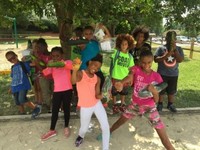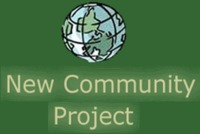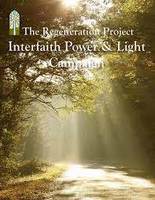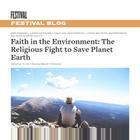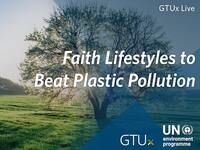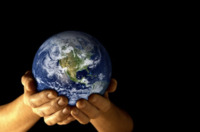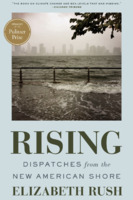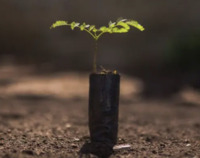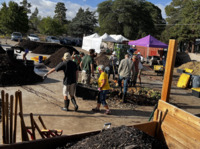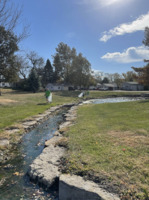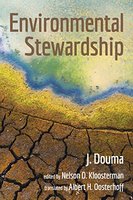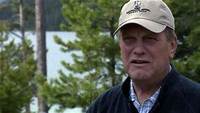Search
74 items
-
Saving Buffalo Reef
This 11-minute video, by the Great Lakes Indian Fish & Wildlife Commission (GLIFWC), informs the viewer of the natural, cultural, and economic importance of Buffalo Reef. This reef is located off the Keweenaw Peninsula, Michigan, in Lake Superior. Buffalo Reef is currently under ecological distress due to local mining activities. Current Tribal, State, Federal, and Academic efforts are underway to help restore this significant environmental feature, as documented in this video. -
Columbus YMCA Youth Engage in 4-H Urban Gardening Program for Cultural Exchange with Youth in Accra, Ghana
This summer, dozens of Columbus North YMCA youth participated in 4-H urban gardening programs as part of an urban agriculture exchange program with 4-H and YMCA youth from Accra, Ghana. In response, in May of 2017, three Ghanaian youth and an advisor will travel to Columbus to share their urban agriculture experiences at the annual Ohio Future Farmers of America (FFA) conference at the Ohio State Fairgrounds. Please click the link below to read more: -
Care for Creation Check List
This Care for Creation Check List is a conversation created by the nonprofit organization New Community Project. The Care for Creation Check List is meant to be read between two people or performed as a skit. One person reads the Genesis creation account while another person uses the list to gauge how other species are doing during the Age of Humans. -
The Regeneration Project
The Regeneration Project was created as the parent project of Interfaith Power&Light. It is meant to help deepen the connection between ecology and faith and to help people of faith recognize and fulfill their responsibility for the stewardship of creation. They do so through educational programs for clergy and congregations -
Faith in the Environment: The Religious Fight to Save Planet Earth
An article discussing the interfaith panel “Ways of Knowing, Ways of Living: Exploring Faith and Conservation” at the 2022 Smithsonian Folklife Festival. The author introduces the four panelists, their faiths, and their respective perspectives on encouraging intersections of faith and environmentalism, with Imam Saffet Abid Catovic representing Muslim faith, Jakir Manela representing Jewish faith, Michael Nephew representing Native American faiths, and Dr. Rachel Lamb representing (Evangelical) Christian faith. -
The Great Global Cleanup
This toolkit is intended to help guide people and groups on how to start and execute a cleanup project to restore communities.
"Follow our simple guide to make the most out of your cleanup. If you need any help, reach out to us at info@earthday.org." -
3000-year-old solutions to modern problems | Lyla June | TEDxKC
"In this profoundly hopeful talk, Diné musician, scholar, and cultural historian Lyla June outlines a series of timeless human success stories focusing on Native American food and land management techniques and strategies. Lyla June is an Indigenous musician, scholar and community organizer of Diné (Navajo), Tsétsêhéstâhese (Cheyenne) and European lineages. Her dynamic, multi-genre presentation style has engaged audiences across the globe towards personal, collective and ecological healing. She blends studies in Human Ecology at Stanford, graduate work in Indigenous Pedagogy, and the traditional worldview she grew up with to inform her music, perspectives and solutions. Her current doctoral research focuses on Indigenous food systems revitalization. This talk was given at a TEDx event using the TED conference format but independently organized by a local community." -
Sustainability Photo Contest
This RESTORExchange photo contest is being brought back from the pre-COVID era, and with an added collaboration with the Sustainability Institute. It's based around the question "What does sustainability look like?" This can include sustainability in environmental justice, technology, energy, lifestyle and wellbeing, society and culture, economy and politics, and any other context where you see sustainability in action. We want to see your perspectives and show all the different places that sustainability is practiced! Winning photos will be decided by a panel of judges (yet to be determined), and the top four photos will win a prize! First place will receive $400, second place will receive $300, third place will receive $200, and an honorable mention will receive $100. Submissions will be accepted through March 15, 2023. -
Faith Lifestyles to Beat Plastic Pollution
"Dr. Iyad Abumoghli and Sarah Berg, Acting Director for the Center for Climate Justice and Faith at Pacific Lutheran Theological Seminary, discuss the ways in which faith communities are uniquely positioned to combat the climate crisis.
This GTUx Lecture will specifically focus on actions that can be taken to combat plastic pollution — an area in which faith-based organizations are positioned to be significant catalyzers through educating, activating and inspiring their communities; developing capacity for sustainable practices; advocating policymakers and mobilizing the private sector; and collaborating with their community partners to advance change." -
Marianist Environmental Education Center
"The Marianist Environmental Education Center (MEEC) is an environmental education community in the Catholic tradition. In Mary's hope-filled spirit, we preserve and act in communion with the land and educate other communities in sustainability through ecology-based simple living, social justice and spirituality." -
Evolution of the Collective Unconscious
"The collective unconscious is made up of experiential knowledge, symbols, and imagery that humans are naturally born with (no tabula rasa) and are rooted in ancestral experience and shared by all persons in all cultures. After millennia of evolution, the current collective unconscious of humanity would seem to include human exceptionalism, patriarchal hegemony, short-terminism, delusions of grandeur, illusions of unending growth, and the idolatry of technology. As the planet becomes overloaded with industrial civilization, our collective mindset seems to be unwilling to think long-term and face the realities of ecological overshoot. It remains to be seen whether our collective mindset can evolve to voluntarily refocus human agency toward contraction of the human enterprise, simplification of lifestyles, and peaceful resolution of conflicts before it is too late to prevent a chaotic collapse of industrial civilization." -
Why Conservative Christians Don’t Believe in Climate Change
"American Christians have become increasingly polarized on issues of climate change and environmental regulation. In recent years, mainline Protestant denominations and the Roman Catholic Church have made explicit declarations of support for global climate action. Prominent Southern Baptists and other evangelical Protestants, on the other hand, have issued statements that are strikingly similar to the talking points of secular climate skeptics, and have attempted to stamp out 'green' efforts within their own ranks. An analysis of resolutions and campaigns by evangelicals over the past 40 years shows that anti-environmentalism within conservative Christianity stems from fears that 'stewardship' of God's creation is drifting toward
neo-pagan nature worship, and from apocalyptic beliefs about 'end times' that make it pointless to worry about global warming. As the climate crisis deepens, the moral authority of Christian leaders and organizations may play a decisive role in swaying public policy toward (or away from) action to mitigate global warming." -
Taoist monks find new role as environmentalists
This article details the efforts of Taoist leaders in China to incorporate sustainability in Taoist temples and promote a culture of environmentalism. Since 2006, the Daoist Ecological Protection Network has gained the support of 120 temples who have converted to the use of solar panels and biofuels. Taoist monks noticed many people to be ignorant towards their environmental impact, living a life of hyper-materialism. Monks wanted to help educate society about the actions that can be taken to ameliorate environmental issues both at the temples and in daily life. This pursuit is driven by a fundamental belief in Taoism to live in harmony with nature, a value that could have large impacts on society if adopted. -
Turning Around Our Relationship with Earth is a Teshuvah Project
The author recounts an unsettling encounter with a utility worker who downplayed the environmental harm of her gas leak. From here, she explains the true negative impacts of methane emissions on both people and the climate, and encourages us to act in a way that "turns around our relationship with Earth". She connects this with the Jewish tradition of Teshuvah, the time in between Rosh Hashanah and Yom Kuppur meant for repentance. -
Al-Mizan: Covenant for the Earth
"The Covenant presents an Islamic outlook on the environment in a bid to strengthen local, regional, and international actions to combat the triple planetary crises defined by the United Nations as climate change, biodiversity loss and pollution. It is a global endeavour to engage Muslims from all levels of society in the development and adoption of this call...
Al-Mizan - A Covenant for the Earth is a restatement of the principles governing the protection of nature in a form that meets current challenges. It examines the ethics behind the social patterning of human existence and enquires into how they could be brought to life today working in harmony with the heartbeat of the natural world." -
Rising: Dispatches from the New American Shore
This resource contains a series of vignettes following Elizabeth Rush as she meets people all around American who have been affected in some way by global sea rising, as well as some of her own personal experiences. She gives voice to those otherwise not heard, and shares eye opening testimonials from those who experience the effects firsthand. -
Plant With Purpose
Plant With Purpose works to restore forests by planting trees in the most devastated and vulnerable parts of the world. They do this because they view the issues of global poverty and environmental damage as interconnected. -
Living Minimally
"The image shows my crew's pitched tents on a beautiful summer day in Indian, Alaska. We were firefighters living mostly out of our tents for the summer. Conservation work and living minimally were ways I practiced sustainability in my life and connected to nature." Taken by Kelsey Wolf. Submitted to the Sustainability Photo Contest. -
Keeping Our Campus Clean
"This picture was taken on my college campus in Missouri. If you’re looking at the photo and you think you see trash bags, then you would be correct. We were doing a nature walk around campus and collecting any trash or recycling that has made its way onto campus. Our grounds team does an amazing job at keeping our campus clean but because of how close neighboring houses are, sometimes trash blows into our little creek. This creek is home to a turtle who likes to pop his head out every once in a while and startle you. There are also quite a lot of different bugs in this area that like to stay near the water!" Taken by Erin Frink. Submitted to the RESTORExchange Sustainability Photo Contest. -
Engaged Organizations: Global Oneness Project
The Global Oneness Project was founded in 2006 as an initiative of Kalliopeia Foundation, and is focused on education aimed a planting seeds of empathy, resilience, and a sacred relationship to our planet. They are passionate about the power of stories and offer a rich library of multimedia stories comprised of award-winning films, photo essays, and essays as well as companion curriculum and discussion guides focused on world culture, social justice and sustainability. -
Environmental Stewardship
This book goes into detail about how the Christian religion goes about environmental stewardship. They look at how bible passages talk about preserving the Earth and the morals we should have surrounding it. It dives deep into how science interacts with human interaction with the Earth and the damage that we have done to Earth, as well as what we should do to correct ourselves. -
How Buddhist monks in Ladakh are fighting climate change
Buddhists Monks in the Himalayas are taking a stand to climate change. On Earth Day 2018, thousands of people came together in the village of Yerat to plant trees. The region is rapidly losing glaciers, causing a shortage in water supply to the villages in the area who rely on snowmelt for water. The volunteers were inspired to participate due to their devotion to His Holiness Kyabgön Chetsang Rinpoche and his vision for "a more verdant and organic Ladakh." -
Seeing true nature: Buddhism and the environment
John Worthington-Hill describes how Buddhism can encourage environmental awareness and sustainability. Embracing individuality is our disconnection from the natural world. In order to live in unity with the earth, we must find the 'middle way' (a buddhist morality based on self-discipline). "Self-centeredness is the great illness from which all imbalance, insensitivity and abuse ultimately stem – an illness directly linked to the Buddha’s ‘three poisons of greed, ill-will and delusion’. These poisonous mentalities seep into the collective consciousness and are instilled in the norms and structures of culture and society, helping to direct how politics and economics deal with the environment." "Environmental destruction is therefore an outer manifestation of an inner affliction. If our thoughts are polluted, then our actions will be polluted too, and so will their consequences." -
GOP Rep. Mike Simpson: "It’s my party, and I’ll fight climate change if I want to"
An article published on Grist.org that covers Congressman Mike Simpson's views on salmon conservation. Simpson's statements are noteworthy for sustainability and religion as he is going against Republican party views by acknowledging an issue with climate change and the environment with his religious views. It is reported that his speech was obviously fueled by a spiritual obligation to preserve salmon as he describes salmon as incredible God created creatures and that their cycle of life should not be messed with. It is also important to note he was already elected for his 11th term in the house, so it is less likely that his more left leaning statements come from a desire to secure votes.


